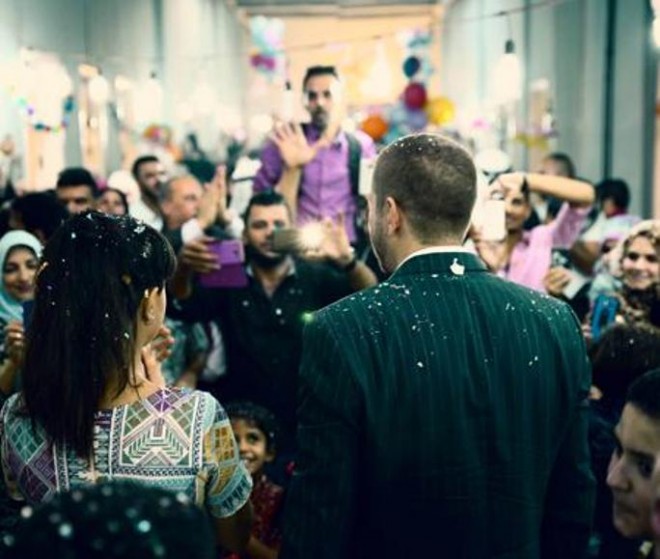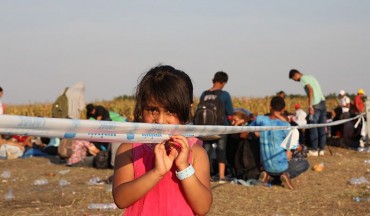 Why blow your wedding bucks on one extravaganza when you can hold two for the same price? Jordanian newlyweds Mutaz Mango and Basma Omar opted to split their celebration, hosting a private party for family and friends and a second for Iraqi and Syrian refugee children living in the old Hashemi al Shemali neighborhood of East Amman. American evangelist David Wilkerson once said, “Love is not only something you feel, it is something you do.” Read how these two did it right.
Why blow your wedding bucks on one extravaganza when you can hold two for the same price? Jordanian newlyweds Mutaz Mango and Basma Omar opted to split their celebration, hosting a private party for family and friends and a second for Iraqi and Syrian refugee children living in the old Hashemi al Shemali neighborhood of East Amman. American evangelist David Wilkerson once said, “Love is not only something you feel, it is something you do.” Read how these two did it right.
The young couple, working with grassroots NGO The Collateral Repair Project, invited refugee children and their families to a special wedding celebration in a downtown Amman hotel. They provided food and entertainment, and distributed food vouchers to the 30 families that attended.
The couple also gave out gifts donated by those who came to their first reception. “We asked the people invited to the wedding to bring gifts the refugees can benefit from since we are donating our wedding gifts to them as well,” Mango told The Jordan Times. He said they decided to hand out food coupons after the United Nations High Commission for Refugees (UNHCR) announced in September that it would drop funding for around 230,000 Syrian families in the Kingdom.
Syrian refugees living in communities across Jordan had received monthly coupons worth $14 USD for each family member. By the end of this month, all that will stop. (Refugees residing in UNHCR camps will continue to receive vouchers valued at $28 USD per person per month.)
UNHCR has registered 628,000 Syrians refugees in Jordan. Eighty three percent live outside camps in cities and towns, and 86 percent of those people are living below the kingdom’s poverty line of $95 USD per person per month. UNHCR estimates Jordan’s immigrant and refugee population at 4.4 million (compared to 6.6 million Jordanian citizens); but most refugees are not registered.
Urban refugees are especially vulnerable as Jordan prohibits them from legal employment. This makes survival in Amman problematic – the city ranked as the most expensive place to live in the Middle East according to the 2015 annual report issued by the Economist magazine.
The Amman newlyweds know this first-hand. Mango works at a family owned business and his wife works at a Hashemi as Shemali tailor shop that provides neighborhood women access to sewing machines, enabling them to generate a small but steady income. They see the refugees struggle on a daily basis.
“We thought of organizing this whole initiative to inspire people,” Mango said, “[It] was a joy. When we first walked in, we were overwhelmed with so many people who were genuinely happy for us. Real human joy has no borders.”
Life boils down to a series of choices. This couple – like the Turkish newlyweds who shared their reception with 4,000 Syrian refugees – chose one way. Others, like the bride who served up a diamond-studded party cake, chose another. Love is not only something you feel, it is something you do.
Image by Youssef Kawar/The Jordan Times




https://www.youtube.com/watch?v=RGtiyyqjoVw
We interviewed 3 of 7 Syrian refugee families whom were abused by the same landlord in Salt, Jordan. This was our third family.
Human Rights Watch and us interviewed this lady, After our interview, the next day Jordanian Security personnel in plain clothes arrested her son.
Afterwards, the other 4 remaining refugee families refused to do any interviews with us, after hearing this woman’s son had been arrested.
I’m sure refugees like this widow are extremely grateful for the hand outs.
Syrian refugee deported from Jordan for being Palestinian:
https://www.youtube.com/watch?v=doraFRY7J2s
Appreciate you comment, Siraj, but the two stories don’t relate. One is about individual action, the other about state policy. The only common thread is that they involve refugees.
Individual kindness is not discounted by bureaucracy. It’s not motivated by a desire to right a systematic wrong, but instead to make a positive difference using our own resources. Here in Jordan, and everywhere there are people in need – I believe that every positive gesture deserves to be broadcast in hope that it will inspire others to act in a similar way.
I (nor the newlyweds in the story) can’t explain or condone government policy on deportation. We just do what we can to help those we can, now.
If you peruse the video, the ‘individual efforts’ were mine and other American expats (I’m sure you weren’t trying to dehumanize us in any fashion but thought I emphasize that very gossamer point) , attempting to help this widow with orphans, but being turned down at every door we knocked upon. I think that’s much more significant and admirable to answer the cries of a widow and succor the stomachs of orphans made such a mistake in policy, by individuals, than feeding them left overs.
Additionally, I feel it is a erroneous fallacy to completely dehumanize bureacracy. As my father always stated verbatum, “there are good and bad people in every government.” And so far, I have discovered it a dictum. Paper pushers and pencil sharpeners at desks have – throughout my career- made decisions based upon human determinants. So I have to state that creating a Manichaean false divide between bureacrats and the very people their policies affect, is indeed wrong.
Finally, I find it very disturbing the tacit message in your reply. We care about feeding refugees, but sorry if their families are ripped apart by our governments. That’s kind of disgusting.
Sounds like you are glamorizing left overs in exchange for the fundamental value of the rights of these humans we categorize as an inhuman refugee neologism. Don’t approve. They don’t need leftovers. They need their families back and jobs and security and rights.
I find anyone striving to help in the latter more deserving of being lauded and praised, than rich snobs who intend to augment their own character via donating left overs scraps from their table of food. Sorry. Just being honest.